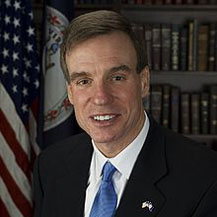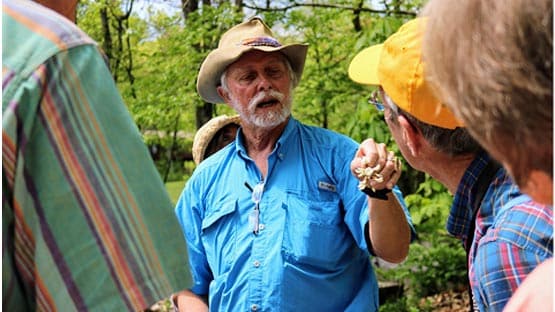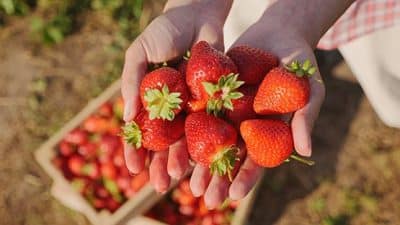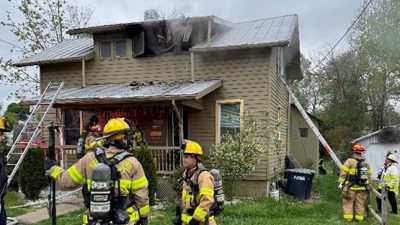U.S. Sen. Mark R. Warner (D-VA) met with constituents, business owners, and local elected leaders at Honor Capital’s “Save-A-Lot” Supermarket in Danville to highlight bipartisan legislation he introduced earlier this month to help more people in low-income and low-access areas in Virginia and across the country access fresh, healthy food.

“More than one million Virginians find themselves in low-income areas with no reliable source of healthy food, placing themselves at higher risk of diabetes, obesity, and heart disease,” said Sen. Warner. “Every person should have access to affordable and nutritious food regardless of where they live. By incentivizing food producers and sellers to go into communities where food access is a problem, we can help guarantee that fresh fruits and vegetables are available in the places where they are needed most.”
USDA defines a food desert as an area where a grocery store is not available within a mile in urban communities or 10 miles in rural areas. This bill expands on that definition by adding U.S. census tracts with a poverty rate of 20% (or higher) or a median family income of less than 80% of the median for the state or metro area. The legislation also defines a grocery market as a retail sales store with at least 35% of its selection (or forecasted selection) dedicated to selling fresh produce, poultry, dairy, and deli items.
The list of organizations supporting the Healthy Food Access for All Americans (HFAAA) Act includes: Bread for the World, Environmental Working Group, Feeding America, Food Marketing Institute, Food Policy Action, Food Research and Action Center, the Food Trust, Local Initiatives Support Corporation, National Grocers Association, U.S. Conference of Mayors, the Reinvestment Fund, and Share Our Strength.
In order to qualify for a tax credit or grant for servicing qualifying food deserts, business and nonprofits must be certified as a “Special Access Food Provider (SAFP) by the Treasury Department and USDA. The Healthy Food Access for All Americans Act qualifies as SAFPs those businesses and nonprofits who service food deserts through the following:
- New Store Construction: Companies that construct new grocery stores in a food desert will receive a onetime 15% tax credit (of the property plan and construction) after receiving certification from a regional CDE and Treasury/USDA as an SAFP.
- Retrofitting Existing Structures: Companies that make retrofits to an existing store’s healthy food sections can receive a onetime 10% tax credit after the repairs certify the store as an SAFP.
- Food Banks: Food banks that build new (permanent) structures in food deserts, will be eligible to receive a onetime grant for 15% of their construction costs, after certification as an SAFP.
- Temporary Access Merchants: Temporary access merchants (i.e. mobile markets, farmers markets, and some food banks) that are 501©(3)s will receive grants for 10% of their service costs for that year.
Sen. Warner has been a strong advocate for initiatives that promote healthy eating and physical wellness. As Governor, he spearheaded the Healthy Virginia initiative, which encouraged policies and practices that promoted good nutrition and regular physical activity in schools and state government. As Senator, he introduced legislation to allow the President’s Council on Physical Fitness & Sports to solicit private funds to expands on its efforts on exercise, nutrition, and wellness.
To read the full text of the bill, click here. A summary can also be found here.
For a map of areas in the United States that would qualify to be served as food deserts under this bill, click here.
Population of Virginians living in food deserts as defined in this bill*
| City or County | Population |
| Albemarle | 3765 |
| Amelia | 5777 |
| Amherst | 10217 |
| Augusta | 6689 |
| Bath | 4731 |
| Bedford City | 6222 |
| Bland | 3901 |
| Bristol | 13982 |
| Brunswick | 8041 |
| Buchanan | 4029 |
| Buckingham | 8400 |
| Buena Vista | 6650 |
| Campbell | 8756 |
| Carroll | 4767 |
| Charlotte | 12586 |
| Chesapeake | 12198 |
| Chesterfield | 14188 |
| Colonial Heights | 2629 |
| Covington | 3098 |
| Cumberland | 10052 |
| Danville | 13980 |
| Dinwiddie | 5720 |
| Essex | 8026 |
| Fairfax | 5280 |
| Floyd | 15279 |
| Franklin | 25439 |
| Franklin City | 3812 |
| Frederick | 10874 |
| Fredericksburg | 7567 |
| Goochland | 4263 |
| Grayson | 5277 |
| Halifax | 32142 |
| Hampton | 29365 |
| Harrisonburg | 15330 |
| Henrico | 37342 |
| Henry | 26005 |
| Highland | 2321 |
| Hopewell | 12120 |
| James City | 4014 |
| King and Queen | 3881 |
| Lynchburg | 38672 |
| Manassas | 7678 |
| Manassas Park | 6248 |
| Martinsville | 6166 |
| Mecklenburg | 15154 |
| Montgomery | 27237 |
| Newport News | 24016 |
| Norfolk | 35038 |
| Norton | 3958 |
| Nottoway | 9783 |
| Orange | 13756 |
| Petersburg | 15759 |
| Pittsylvania | 18926 |
| Portsmouth | 9507 |
| Prince Edward | 10624 |
| Prince George | 8543 |
| Prince William | 57728 |
| Radford | 12260 |
| Richmond City | 60545 |
| Roanoke City | 41329 |
| Rockbridge | 15873 |
| Rockingham | 11530 |
| Salem | 10424 |
| Scott | 7959 |
| Shenandoah | 9068 |
| Smyth | 3913 |
| Southampton | 7958 |
| Spotsylvania | 31964 |
| Stafford | 12818 |
| Suffolk | 4795 |
| Sussex | 6377 |
| Tazewell | 12740 |
| Virginia Beach | 35279 |
| Warren | 5562 |
| Washington | 3812 |
| Waynesboro | 5240 |
| Winchester | 5066 |
| Wise | 9566 |
| Wythe | 6773 |
| Total: | 1,048,359 |
*The last year for which data is available is 2015.










